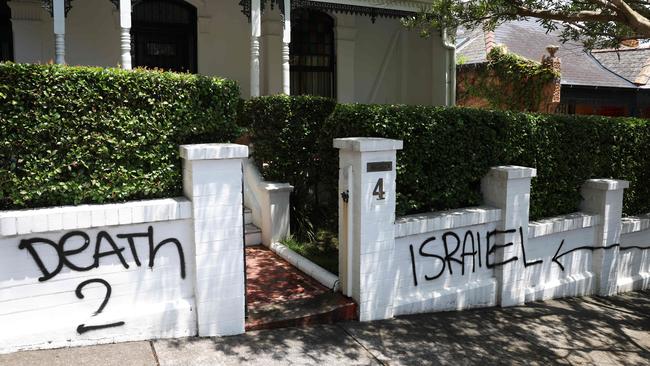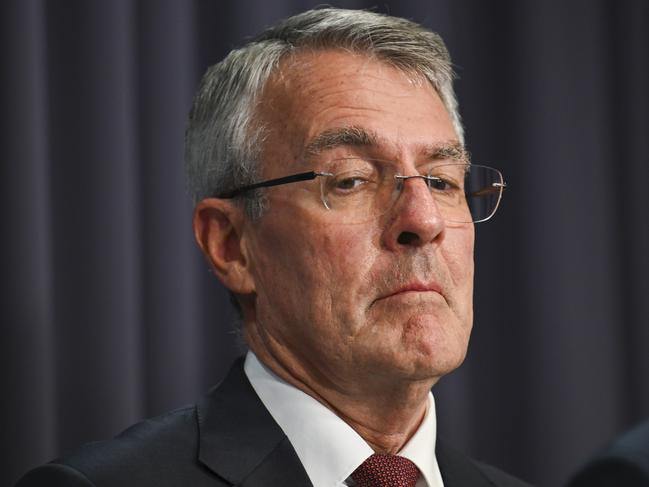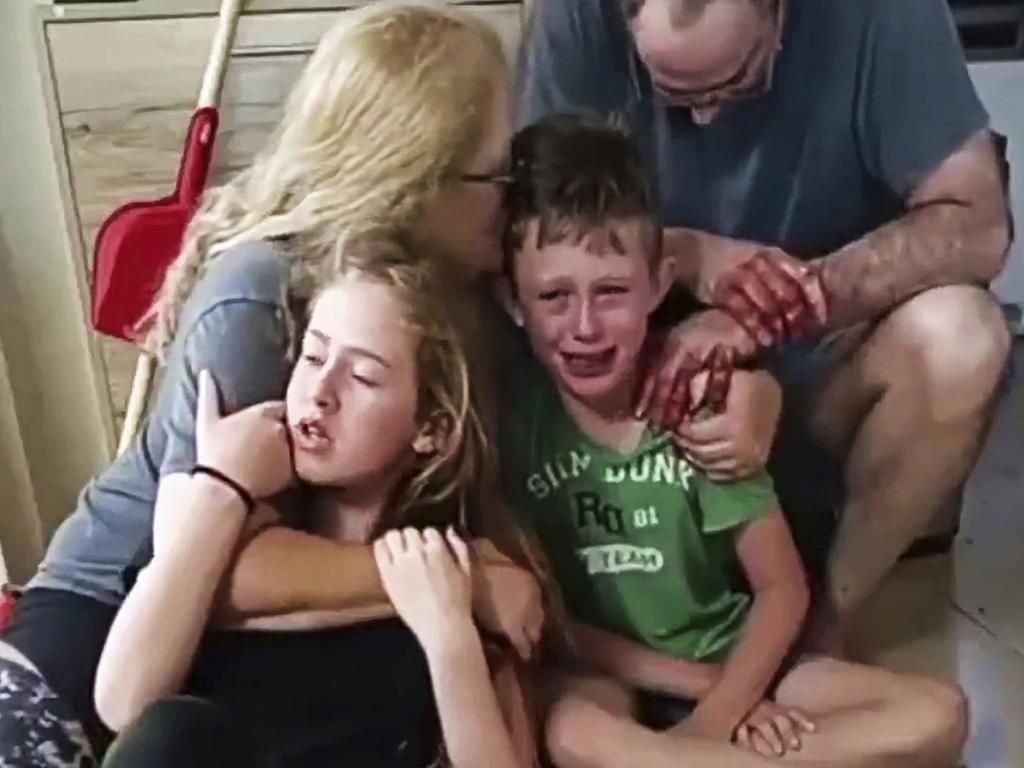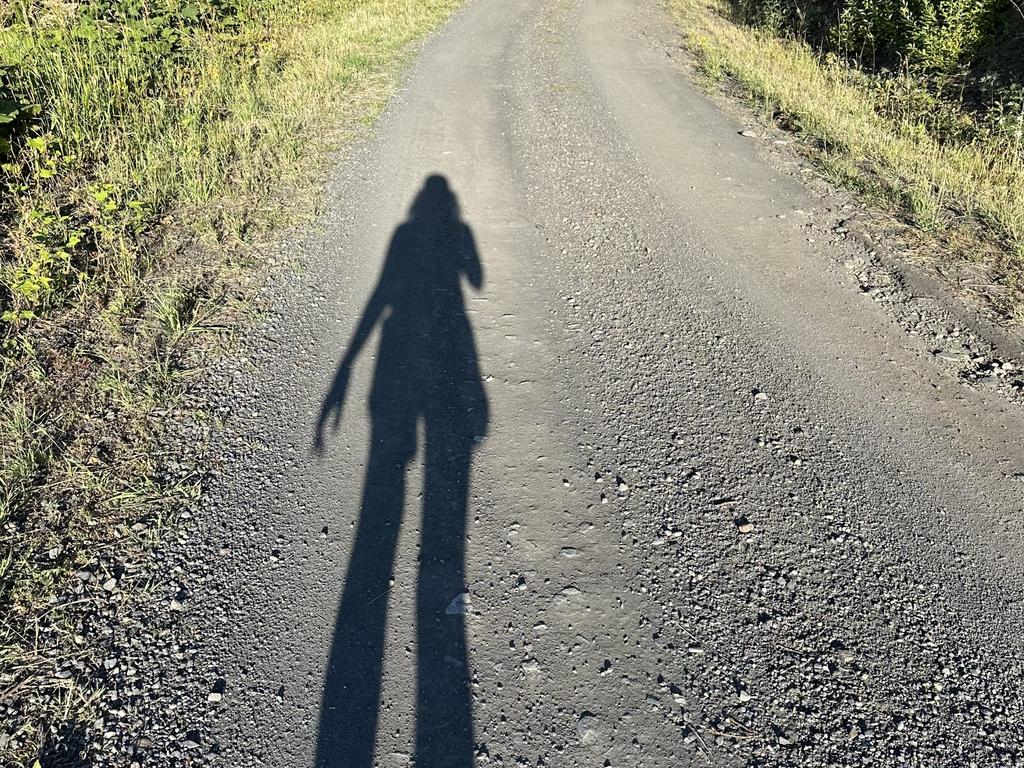
Violence is a very serious crime that carries a prison sentence. Inciting violence has the real potential to cause violence. Hence, this is also a serious crime that can result in jail time.
Since October 7, 2023, the Jewish community has been subjected to horrendous acts and words that incite violence. We need laws right now to combat this. Talk of laws to combat hate speech is confusing. We need to clearly distinguish incitement to violence from hate speech. The former must not be tolerated in a free society. The latter must be tolerated if a society is to remain free.
We need better incitement to violence laws so we can immediately prosecute those who scrawled “DEATH 2 ISRAIEL” (sic) and “KILL ISRAIEL” (sic) on the walls of homes in Sydney’s eastern suburb of Woollahra this week. Even an illiterate moron knows these words won’t affect a country thousands of kilometres away. But these same words can very likely incite violence against Jewish people in Australia.

Yet current federal incitement to violence laws probably wouldn’t catch those responsible for these latest atrocities in a suburb where many Jews live.
The current Commonwealth Criminal Code requires that, to be culpable, a person shows an intent to urge another person to use violence and that the accused intended violence to occur. The current laws won’t apply to a person who is simply reckless about their words inciting violence. The Criminal Code also contains a ridiculous defence – you can incite violence if it’s done in “good faith”. There is nothing good about inciting violence. And no faith, whether it’s a religious, political or other belief, should be a defence to inciting violence.
With two small reforms – criminalising reckless incitement to violence and abolishing the “good faith” defence – the Labor government and the Prime Minister could have demonstrated they are serious about giving police the laws needed to prosecute people who incite violence against Jews.
While Attorney-General Mark Dreyfus announced proposed changes in September, sensibly aimed at fixing these two flaws in current federal criminal laws, the amendments were shelved despite bipartisan support from the Coalition. Instead, the government has been busy passing myriad other laws.

The Prime Minister failed to strengthen incitement to violence laws while failing to show moral leadership. These epic failures by the Albanese government have meant that incitement to violence on our streets culminated in actual violence – the terrorist attack on the synagogue in Melbourne.
Inquirer has been told by numerous sources close to the proposed changes to the Commonwealth Criminal Code that the reforms were sidelined after some Jewish groups criticised them for not going far enough. Some Jewish groups want laws that criminalise hate speech – in effect, turning the notorious section 18C of the Racial Discrimination Act into a criminal law, not a civil law.
To be sure, inciting hatred is a wicked thing – but it is fundamentally different to inciting violence. Criminalising hate speech, attaching jail terms to words that offend, is a bridge too far in a democracy.
This is where leadership matters. Instead of sidelining important amendments to the incitement to violence laws, the Prime Minister should have made the compelling argument about the difference between hate speech and words that incite violence. He should have insisted that the two necessary and simple changes be made immediately to the Criminal Code and ignored the overreaching attempt to expand hate speech laws.
There is a second danger with Albanese’s weak leadership. If, to make amends for more than a year of pathetic leadership, he succumbs to calls to criminalise hate speech, to send people to jail for causing offence or for inciting hate, that will damage our democracy.
Hate speech laws are, by their nature, vague. What one person finds hateful, another person may regard as merely unpleasant. And vague laws are usually a giveaway sign of bad laws. They often invite judges to play philosopher king.
It was bad enough that Federal Court Judge Mordecai Bromberg, a former union rights activist and Labor Left candidate for preselection, banned certain newspaper articles under section 18C. What might a similar kind of judge do to a person with different, even offensive, political views, if 18C is in effect turned into a criminal prohibition?
When we have the right to speak freely, to cause offence, even to hate freely, a democratic country can be an uncomfortable place at times. If we curb those human rights, occasional discomfort is replaced with constant state-sanctioned oppression.
Criminalising hate speech won’t get rid of hatred; it will more likely send hatred into dark places, where it will fester. The better way to combat hate speech is with fast and furious moral condemnation, not by legal sanction.
Witness what happened to Nomad restaurant founder Al Yazbek after he brandished a sign bearing a swastika superimposed on an Israeli flag at a pro-Palestine rally in Hyde Park in October. Civil society acted swiftly and decisively long before a judge imposed a fine on Yazbek. There were mass cancellations at Yazbek’s up-market restaurants Nomad Sydney, Nomad Melbourne and Reine & La Rue.

Moral condemnation didn’t happen because Yazbek was charged with a crime. It happened because people were disgusted with his actions. The great risk is that if we rely on laws to stamp out hate speech, we not only chill free speech but civil society abdicates to police and the courts its role in passing judgment on offensive speech.
There is a real danger of a politically spooked Albanese now overreacting and introducing sweeping hate speech laws instead of simple and targeted reforms against inciting violence.
Attempted legislative overreach in the shadow of an election has happened before at times of heightened community anxiety. Think of moves in the 1950s to ban the Communist Party. Robert Menzies won power at the 1949 election at least in part because he promised to ban the Communist Party on national security grounds.
And it’s not easy repealing bad laws. It took the High Court to get rid of Menzies’ Communist Party Dissolution Act.
The final risk is the Wong factor. Penny Wong adds to Albanese’s weakness. Six weeks into his prime ministership, John Howard knew instinctively that he had to do something about gun laws immediately after the Port Arthur massacre.
When Sheik Ibrahim Dadoun and others celebrated the Hamas terrorist attacks a day after innocent Israelis – men, women, and children – were slaughtered, and others taken hostage on October 7, 2023, Albanese was no newbie Prime Minister. His first instinct should have been moral leadership and immediate moves to strengthen federal incitement to violence laws.
Instead, his first instinct appeared to be to ask Wong what to do. Since then even Labor figures recognise that Labor’s response to anti-Semitism has been shaped not by the Prime Minister but by the Foreign Minister’s criticism of Israel. It has taken more than 14 months for the Prime Minister to have an epiphany about anti-Semitism, expressing shock this week when speaking at the Sydney Jewish Museum.
A Prime Minister in thrall to Labor’s fiercest Left faction spear-thrower has been catastrophic for the Jewish community – and for his leadership.
If Albanese tries to make amends with sweeping hate speech laws, instead of simply fixing the incitement to violence laws, that will be a win for Wong – and others who would gladly see the state sanction free speech. And it would be a tremendous loss for liberty in this country.







Much has been said about the Prime Minister’s lack of leadership in combating anti-Semitism since October 7, 2023. There is one omission. After more than a year of escalating attacks on Jews in this country, the Albanese government decided to sideline two simple and critically important changes to federal incitement to violence laws.